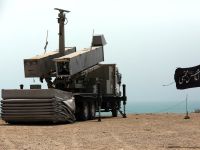DMA discusses cooperation with the United Nations Human Settlements Program
H.E. Majed Ali Al Mansouri the chairman of the Department of Municipal Affairs (DMA) had received a delegation from the United Nations Human Settlements Program, consisting of Dr. Mostafa Madbouly, Director of regional Office for Arab States, and Mr. Dan Lewis, Chief of Urban Risk reduction Unit.
The meeting which was attended by H.E. Engineer Ahmed Mohammed Al Shareef, the Undersecretary of the Department of Municipal Affairs, and H.E. Khalifa Mohamed Al Mazrouei, Director General of the Municipality of Abu Dhabi City and a number of executives and officials in the municipal system, discussed ways to strengthen cooperation in the field of urban planning, sustainable development and infrastructure facilities and services provided by the cities..
This meeting comes within the framework of the keenness of the United Nations Human Settlements Program to enhance cooperation with the UAE in light of the significant progress made in the field of sustainable economic development, particularly that the program is directly connected with Sustainable Urban Planning in the Member States and the establishment of policies to achieve progress and prosperity for citizens around the world. In this context, H.E. Majid Ali Al Mansouri Chairman of the DMA said that the UAE achieved a leading position on the world stage in the field of sustainable urban development based on the development policies and large projects established by our government in this area, and those that are currently being implemented within the framework of the green economy and associated closely to sustainable development and contribute to the optimal use of natural resources and support the country's efforts to achieve the Millennium development goals set by the United Nations.
For his part, the delegation of the United Nations Human Settlements Program gave a detailed presentation about the program, its objectives and its contribution to the support of sustainable urban development and urban policies that contribute to the achievement of sustainable economic growth and enhance the capacity of cities to resist crises and natural disasters. The program reviewed a potential plan to enhance cooperation with the Municipal System by exchanging experience in several areas, including capacity building and knowledge in the areas of sustainable development, and strengthen the capacity of municipalities to cope with any environmental hazards or natural disasters through the development of the institutional framework and rehabilitation programs where appropriate, and building international experiences for young Emiratis in the field of sustainable development. The potential prospects of cooperation could also include establishing a regional center in the Emirate of Abu Dhabi for excellency and best practice in the field of sustainable development, and also to organize some international events related to the program in the Emirate of Abu Dhabi.
In order to strengthen its capacity to deal with the challenges of the future, the program established a new strategy based on a new model of urban development, the aim of which to deal with the demographic challenges of rapid urbanization and the high proportion of young people and different cultures in the cities, and the establishment of smart cities based on best practice and relies on the development of human capacity and laying the groundwork that increase the economic competitiveness of the city and enhance their ability to attract investment and create jobs for young people.
It is worth mentioning that there are many countries around the world are experiencing difficulties in dealing with the requirements of the urban growth and lack of employment opportunities for young people, while experts expecting that urban cities will count for 70% of world population density by the year 2050, which creates big challenges for many countries to review current urban planning and development policies and drive new ones enabling to achieve sustainable development and enhance the living standard and quality of life for the inhabitants in the heavily populated urban settlements.






